Small business owners often find themselves juggling multiple tasks, making the demand for intuitive and effective customer support tools more critical than ever.
Enter help desk and ticketing software—these platforms streamline communication, boost productivity, and enhance customer satisfaction by effectively managing support requests. With so many options available, choosing the right software can be overwhelming; however, certain features like multichannel support, automation, and integration capabilities can significantly impact your decision.
In this article, we will explore the top 10 help desk and ticketing software solutions tailored for small business owners. Alongside practical examples and advice to help you make an informed choice.
Table of Contents
- Comparison table of the top 5 small business help desk software
- What should you look for in customer service software for SMBs?
- LiveAgent: Versatile solutions for growing businesses
- Freshdesk: User-Friendly Interface and Automation
- Zendesk: Multichannel support and integration
- Help Scout: Personalized customer interactions
- Zoho Desk: Affordable and feature-rich
- HubSpot Service Hub: integrated with marketing tools
- Kayako: Collaboration and real-time messaging
- HappyFox: Robust reporting and ticket management
- Jira Service Management: Ideal for tech-savvy teams
- Tidio: AI-powered customer service and chatbot
- How to choose the best help desk for your small businesses
- Conclusion
Comparison table of the top 5 small business help desk software
When choosing help desk software for a small business, you have many options. Below is a comparison table of the top 5 help desk solutions that can enhance your customer support operations:
| Software | Pricing (Agent/Month) | Free Trial | Best Features |
|---|---|---|---|
| LiveAgent | $15 | Yes | User-friendly interface, Workflow automation, Advanced ticketing features |
| Zoho Desk | $18 | Yes | Mobile app, Self-service portals, Automation features |
| Freshdesk | $15 | Yes | Intuitive iInterfaces, Ticket resolution times, Customer satisfaction metrics |
| Zendesk | $19 | Yes | Desk features, agent performance tracking, Extensive integration options |
| Help Scout | $20 | Yes | Customer communications, Flexible ticketing system, Collaborative tools |
LiveAgent stands out for small businesses due to its combination of intuitive design and powerful features like workflow automation and advanced reporting. Zoho Desk and Freshdesk also offer user-friendly options for managing customer interactions and improving response times. Zendesk and Help Scout provide more robust desk software solutions, suitable for businesses seeking extensive features.
This table can be your starting point to decide which software best fits your needs, considering your ticket volume and specific customer service goals.
What should you look for in customer service software for SMBs?
When selecting customer service software for small businesses, focus on an intuitive design and user-friendly interface. This enables efficient management of customer inquiries without extensive training. Scalability is crucial, as your software should accommodate growth and increased ticket volume seamlessly. Integration capabilities are also vital to ensure connectivity with other tools used by small businesses.
Here are key features to consider:
- Ticket Tracking: Allows for organized management of customer requests.
- Basic Reporting: Provides insights into support operations.
- Automated Task Management: Streamlines repetitive tasks and improves response times.
Additionally, opt for software that offers diverse support options, such as customer service representatives and self-service guides, to ease implementation and assist users effectively.
Here’s a quick comparison table for convenience:
| Feature | Importance |
|---|---|
| Intuitive design | Facilitates ease of use |
| Scalability | Supports business growth |
| Integration capabilities | Enhances productivity |
| Essential features | Improves support operations (ticket tracking, reporting) |
| Support options | Facilitates smooth implementation |
LiveAgent: Versatile solutions for growing businesses
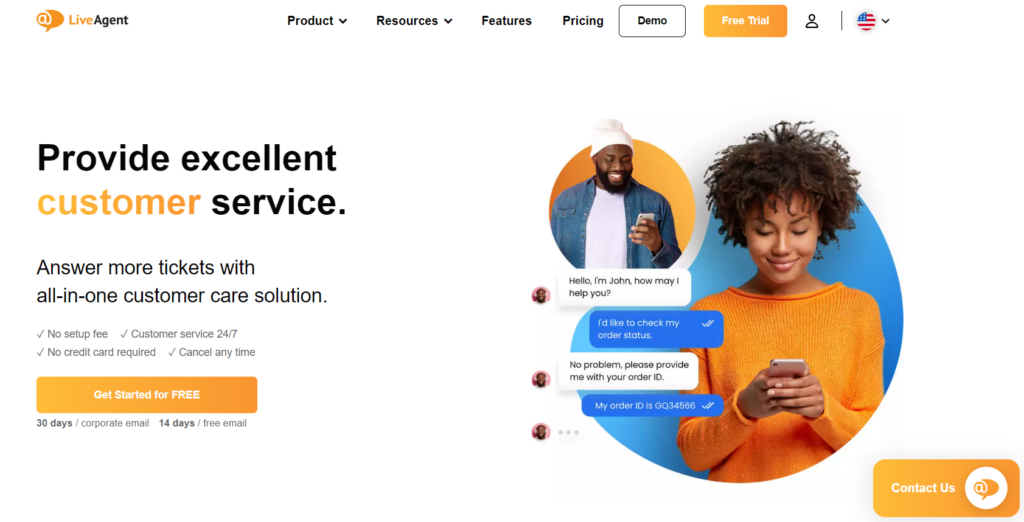
LiveAgent is a robust help desk software offering multichannel support, seamlessly connecting businesses with customers across chat, email, phone, social media, and video. This comprehensive platform includes a ticketing system and a universal inbox. These features allow for efficient management of all customer inquiries, ensuring no message goes unnoticed.
One standout feature of LiveAgent is its lightning-fast live chat. This tool enables quick, smooth conversations with customers, which can significantly boost satisfaction and resolution times. Additionally, LiveAgent integrates with mobile applications. This mobility allows support teams to handle customer interactions from anywhere, ensuring prompt and flexible service.
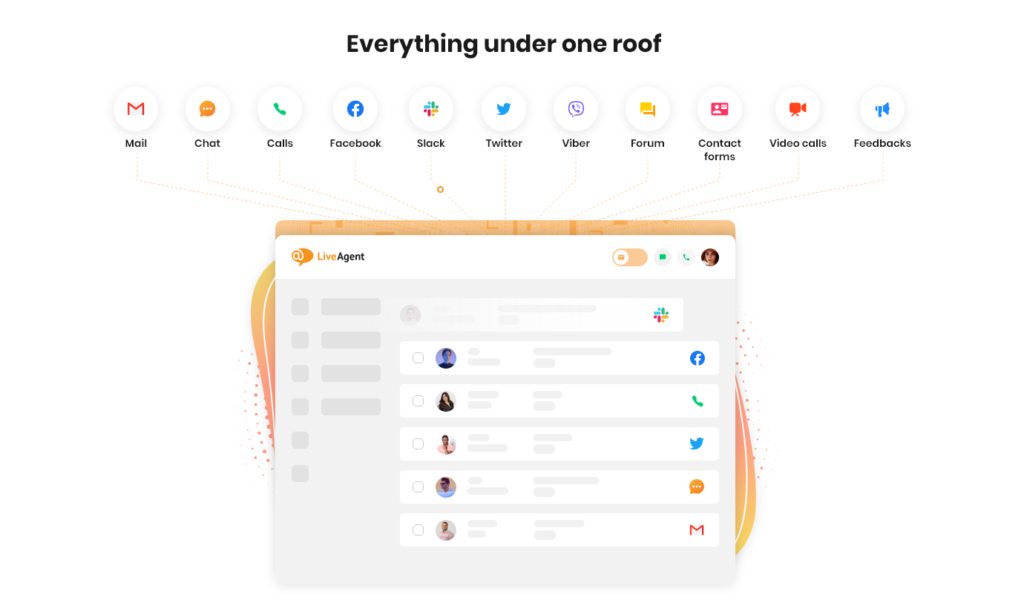
What makes LiveAgent particularly appealing for small businesses is its extensive free plan. This option provides a cost-effective solution for those with budget constraints, without compromising on essential features.
Key Features of LiveAgent:
- Multichannel Support: Connect via chat, email, phone, social media, and video.
- Universal Inbox and Ticketing: Centralize and organize customer queries.
- Fast Live Chat: Facilitate quick customer communications.
- Mobile Integration: Handle requests on the go.
- Extensive Free Plan: Ideal for small business owners.
LiveAgent pricing
While LiveAgent does have a free version of their software, there are some limitations. Similarly, they grant a 30-day free trial for you to navigate through their services. In case you require more advanced features, you have a choice among four of their subscription-based plans.
These encompass the Small plan at $15 per month per agent, the Medium plan costing $29 per month per agent, the Large plan priced at $49 per month per agent, and the Enterprise plan, which stands at $69 per month per agent.
LiveAgent’s integration capabilities and advanced features make it an ideal choice for efficient customer support solutions.
Freshdesk: User-Friendly Interface and Automation
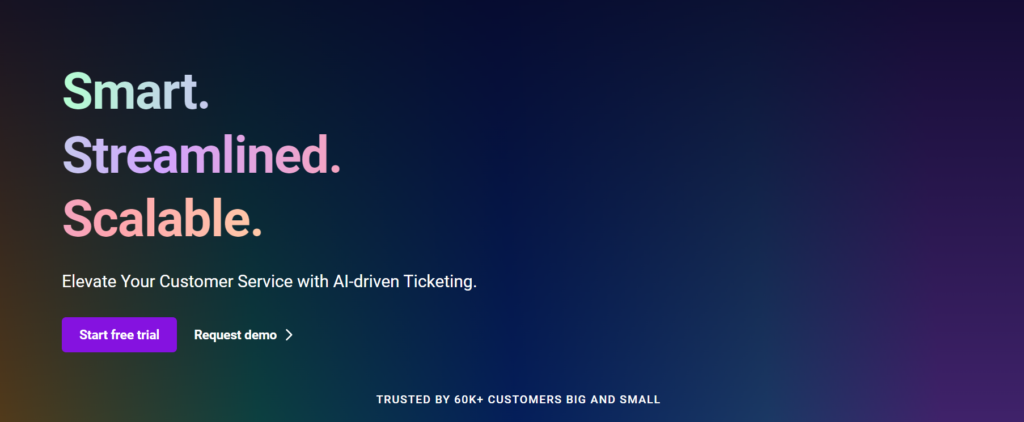
Freshdesk stands out for its user-friendly interface and advanced automation capabilities. This makes it a great option for small businesses seeking efficient help desk solutions.
Freshdesk offers self-service options like knowledge bases and FAQs, allowing customers to find answers on their own. This reduces ticket volume and improves customer satisfaction. The platform’s AI-powered chatbots handle specific customer inquiries with speed and accuracy, cutting down response times even outside normal business hours.
Automation is a strong suit for Freshdesk. Customizable automations help businesses streamline workflows by automatically assigning tickets based on agents’ expertise and availability. This feature optimizes customer service operations and frees up small teams to address more complex issues.
Key Features of Freshdesk:
- Self-Service Options: Reduce ticket volume with FAQs and knowledge bases.
- AI Chatbots: Improve response times with instant assistance.
- Workflow Automation: Streamline tasks with automatic ticket assignments.
- Reporting Tools: Monitor and boost productivity through dashboards.
Freshdesk offers a variety of pricing plans to cater to different business needs:
- Free Plan: This plan includes integrated ticketing across email and social platforms, a knowledge base, and is suitable for up to 10 agents.
- Growth Plan: Priced at $15 per agent per month, this plan builds on the Free plan by adding automation features and access to over 1000 marketplace apps.
- Pro Plan: Available for $49 per agent per month, it offers advanced automation, support for up to 5000 collaborators, custom roles, and objects.
- Enterprise Plan: This plan is priced at $79 per agent per month and includes full support with bots and the capability to handle unlimited products.
Zendesk: Multichannel support and integration
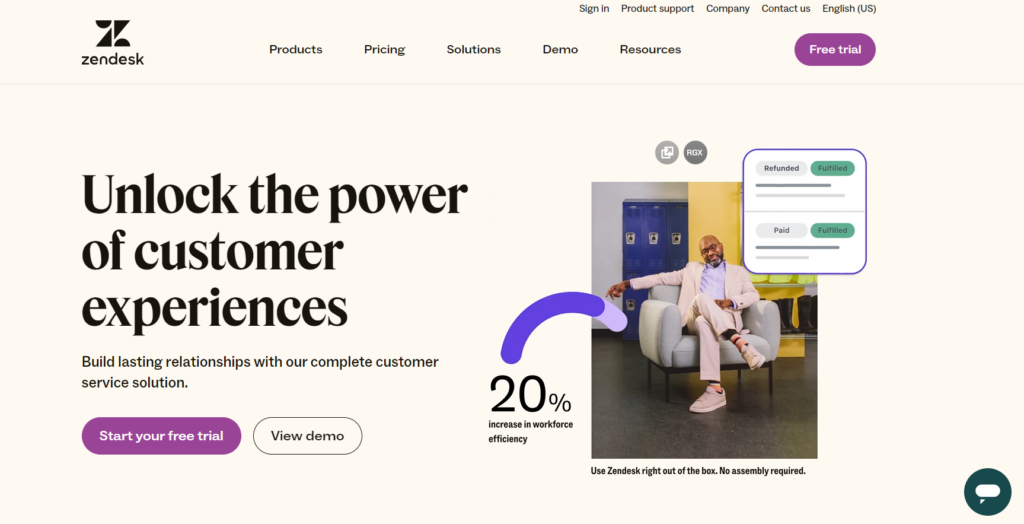
Zendesk provides versatile solutions tailored for growing businesses aiming to streamline customer support. Its user-friendly interface makes navigation easy for both support agents and end-users, ensuring an improved customer service experience.
A standout feature is the smart ticketing system. It automates ticket assignments, optimizing workflow by distributing tasks based on predefined criteria. This automation reduces ticket resolution times and helps the customer support team focus on more complex customer issues.
Another significant advantage is the Zendesk Marketplace. Here, small businesses can integrate over 700 pre-built apps and tools without needing extensive technical knowledge. This enhances the platform’s flexibility and allows for a more comprehensive customer support operation.
Zendesk’s contextual agent workspace boosts productivity by minimizing the time spent switching between tabs. This workspace also supports omnichannel messaging, making customer communications seamless.
Key Features:
- User-Friendly Interface
- Smart Ticketing System
- Comprehensive Marketplace
- Contextual Agent Workspace
- AI Integration
Zendesk offers a variety of pricing plans to accommodate different business needs:
- Free Plan: $0 for up to 2 users (limited features).
- Starter Plan: Starting at $18 per user per month, suitable for small teams starting out.
- Professional Plan: Starting at $800 per month, tailored for businesses that require more advanced features and scalability.
- Enterprise Plan: Pricing varies based on specific requirements, offering deep customization and extensive support features.
Help Scout: Personalized customer interactions
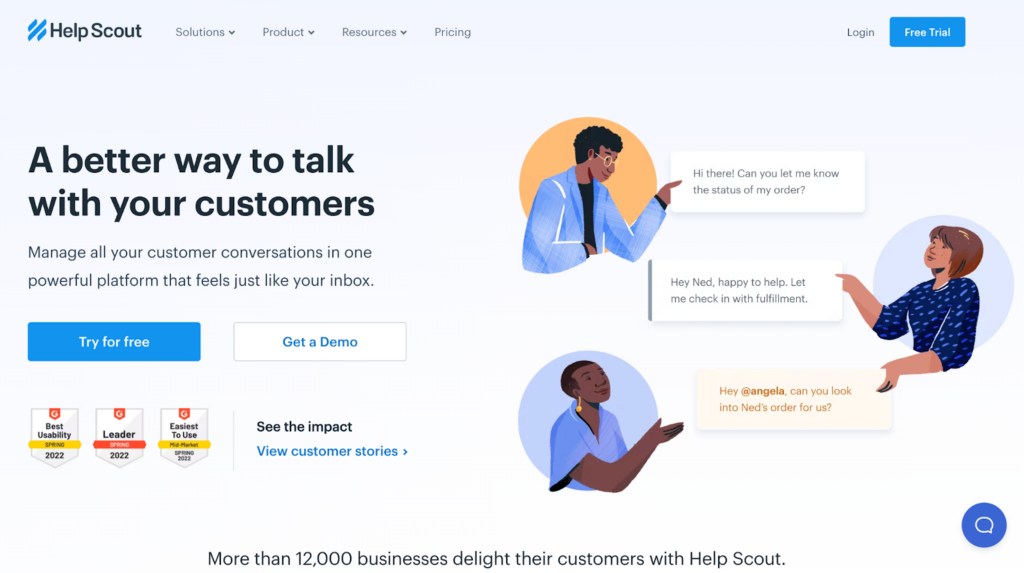
Help Scout specializes in providing a seamless customer support platform, emphasizing personalized interactions across multiple channels. Its shared inbox feature enhances team collaboration, allowing support members to assign, tag, and organize conversations efficiently. This streamlining aids in managing customer interactions more effectively.
The software stands out with its strong automation and workflow capabilities. These features help businesses manage support tickets with enhanced efficiency, aiming to reduce response times. Its user-friendly and straightforward interface makes it particularly appealing to startups and small businesses, as it requires little training.
Help Scout also includes AI tools that strengthen replies and summarize conversations, adding a personalized touch to customer interactions. This not only improves engagement but also contributes to customer satisfaction.
Here’s a quick overview of Help Scout’s features:
- Shared Inbox
- Automation and Workflow
- User-Friendly Interface
- AI Tools
Help Scout Pricing:
- Standard Plan: $25 per user/month
- Plus Plan: $50 per user/month
- Pro Plan: $65 per user/month (Billed annually)
Free Trial: 15 days
This combination of practical features makes Help Scout a valuable tool for any small business seeking to optimize customer support operations.
Zoho Desk: Affordable and feature-rich
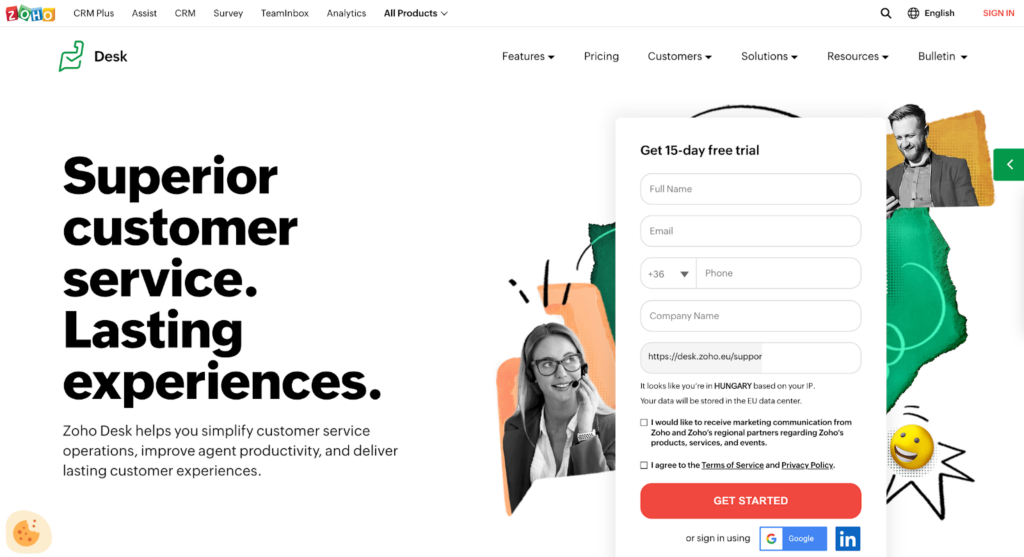
When it comes to affordable and feature-rich help desk software, Zoho Desk stands out for small businesses, startups, and freelancers. Designed to manage customer service operations efficiently, it offers a multi-channel ticketing system. This ensures businesses can handle customer queries via email, social media, and web forms, creating an omnichannel experience.
Key Features of Zoho Desk:
- Ticket Management: Organize and streamline customer inquiries.
- Knowledge Base: Provide a self-service portal for customers.
- Automated Responses: Improve ticket resolution times.
Zoho Desk is budget-friendly with pricing starting at $14 per user per month. This makes it an ideal choice for small business help desk solutions. Its user-friendly interface ensures easy implementation. Most small businesses can have it up and running in just a day or two, without needing extensive IT knowledge.
Zoho Desk offers a range of pricing plans designed to accommodate the needs of small businesses and startups. Below are the available plans and their respective prices:
Free Plan:
- Up to 3 agents can use Zoho Desk’s free version simultaneously.
- Ideal for small teams just starting out.
Standard Plan:
- Price: $14 per user per month.
- Includes essential support features for effective ticket management.
Professional Plan:
- Price: $23 per user per month.
- Offers simplified collaboration and enhanced process automation.
Enterprise Plan:
- Price: $40 per user per month.
- Provides advanced features such as live chat, advanced AI capabilities, and extensive customization options.
With Zoho Desk, small business owners can enhance their customer support operations without breaking the bank. It strikes the perfect balance between cost and capability, providing essential desk features for maximum customer satisfaction.
HubSpot Service Hub: integrated with marketing tools
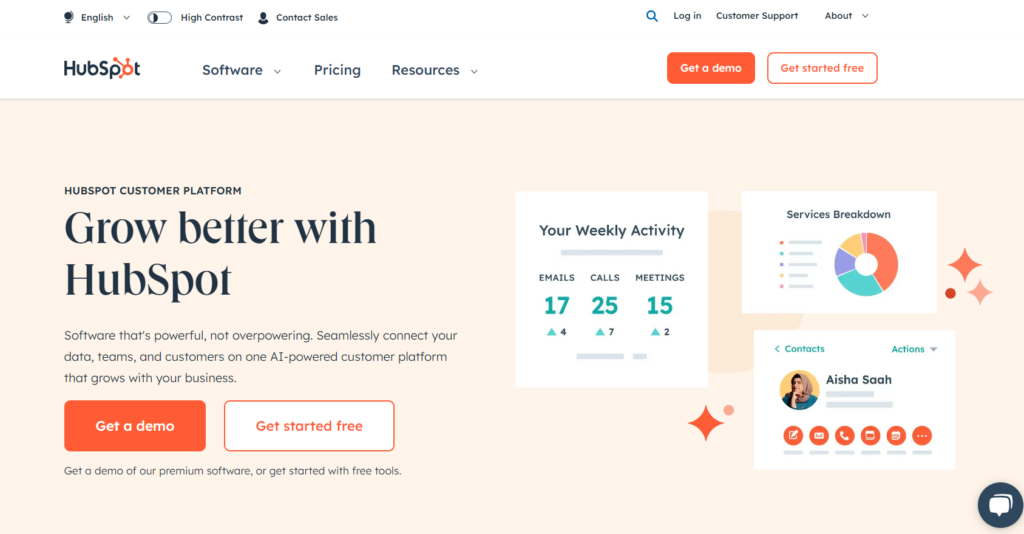
HubSpot Service Hub is a versatile tool that integrates seamlessly with marketing and sales data. It offers personalized support through unified customer insights, making it an invaluable asset for businesses. A standout feature is its ticketing system, which automatically assigns tickets to representatives based on their skills, ensuring quick and effective resolutions.
The software includes a range of features designed to enhance customer support. It offers a knowledge base that allows customers to find answers on their own, reducing the workload on support teams. The customer feedback feature is another highlight, aiding in continuous improvement of services.
A key advantage of HubSpot Service Hub is its integration with HubSpot CRM. This helps eliminate data silos, providing clarity and cohesion across the organization. Built-in AI functionalities further boost efficiency by providing automatic recommendations and AI assistant features.
Key Features:
- Ticket Automation: Skill-based ticket assignment for efficient resolutions.
- Customer Feedback: Valuable insights for service improvements.
- Knowledge Base: Empowers self-service for customers.
- AI Tools: Enhance efficiency with smart recommendations.
- CRM Integration: Promotes data clarity and eliminates silos.
Here is the pricing information for HubSpot Service Hub:
- Free: $0 per month (limited features)
- Starter: $20 per month (includes 2 users)
- Starter CRM Suite: $50 per month
- Professional: $500 per month (includes 5 users)
- Enterprise: Starts at $1,200 per month (includes 10 users, billed annually)
Additionally, HubSpot Service Hub offers a free trial for 14 days.
Kayako: Collaboration and real-time messaging
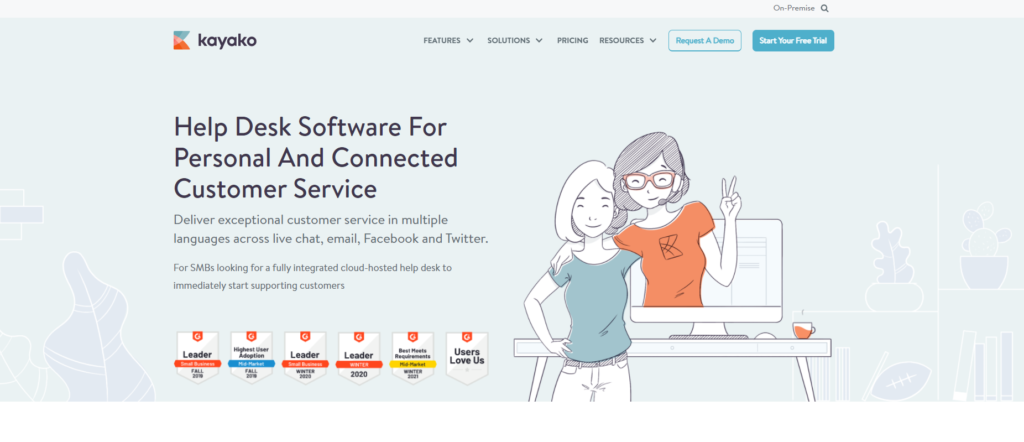
Kayako is specially crafted for small and medium businesses (SMBs), providing instantaneous functionality to elevate customer service. It offers collaboration features that enable real-time teamwork, significantly enhancing customer service experiences. With features allowing a comprehensive view of customer journeys, teams can better understand interactions and improve service delivery.
Pricing options are flexible with Kayako, presenting an all-inclusive model. This includes a cloud-based solution and a classic on-premises model, though pricing details require direct contact for quotes. Kayako’s platform shines in its ability to add collaborators to the mix. This ability ensures that multiple team members can work together efficiently on customer support tasks.
Here’s a glimpse of Kayako’s key features:
- Real-Time Collaboration: Work together instantaneously to solve customer issues.
- Complete Customer View: Understand interactions deeply to enhance service.
- Flexible Pricing Models: Choose between cloud-based and on-premises options.
Together, these features help small businesses streamline their support operations, providing quick and effective solutions to customer inquiries. This makes Kayako a formidable option for business owners looking to improve their customer service dynamics.
HappyFox: Robust reporting and ticket management
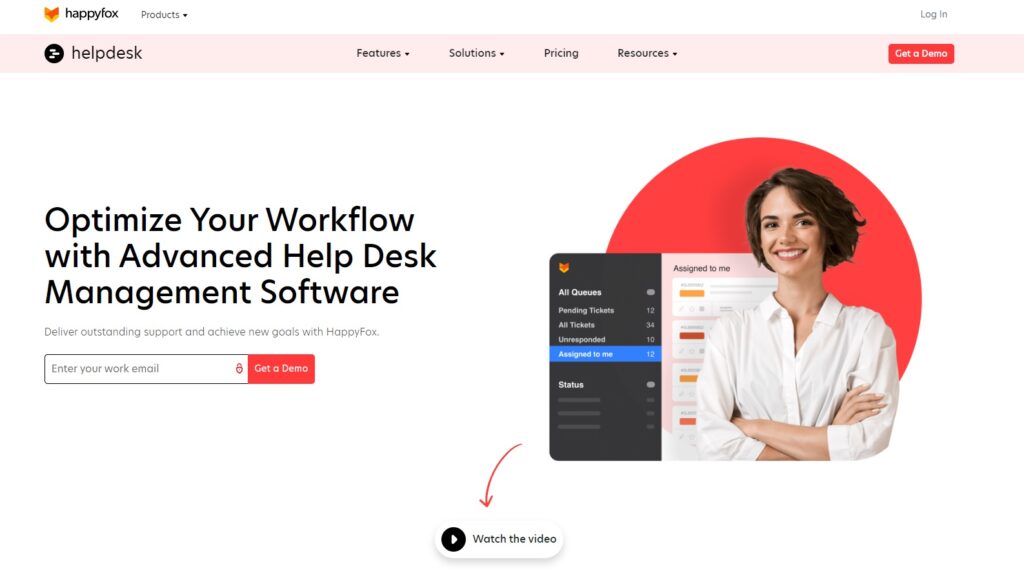
HappyFox is a powerful help desk software tailored for small businesses looking to streamline their customer support operations. It offers a robust ticketing system that efficiently organizes customer inquiries, enhancing both support efficiency and customer satisfaction.
The platform’s multichannel support allows teams to manage customer interactions from email, chat, social media, and phone, all within a single system. This integration means that customer requests from various platforms can be handled seamlessly without switching between different applications.
A standout feature of HappyFox is its workflow automation, which automatically assigns tickets based on predefined rules. This significantly reduces repetitive tasks and speeds up response times. Additionally, integration with tools like Slack and Microsoft Teams ensures effortless ticket entry and management, further improving team coordination.
The reporting and analytics capabilities of HappyFox allow businesses to delve into performance metrics, offering insights to enhance service quality. With detailed reports, small business owners can track ticket volume, ticket resolution times, and other key indicators critical to customer support success.
HappyFox Pricing:
- Standard Plan: Starts at $29 per agent per month
- Enterprise Plan: Custom pricing
HappyFox also offers a 14-day free trial to help you evaluate the software before committing to a paid plan.
Overall, HappyFox delivers an intuitive interface and advanced features that empower small business help desks to surpass customer expectations efficiently.
Jira Service Management: Ideal for tech-savvy teams
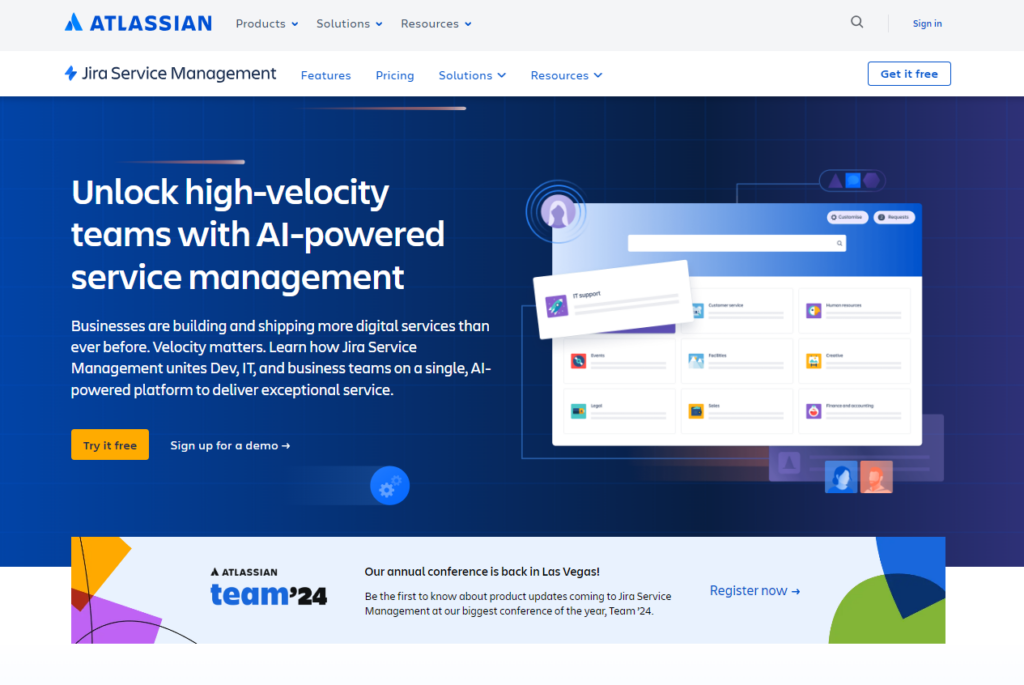
Jira Service Management is a perfect fit for tech-savvy teams, especially IT departments. The software offers a free plan for up to three agents, making it accessible for small businesses to manage their help desk operations.
Key Features:
- Multi-Project Automation: Streamline your processes with enhanced automation across multiple projects.
- SLA Management: Maintain performance targets with built-in SLAs.
- Custom Workflows: Tailor workflows to fit your team’s unique needs.
Jira’s self-service portal enhances user experience by granting easy access to information. Additionally, it integrates with various authentication services and messaging channels, though some integrations might require additional subscriptions.
Jira Service Management Pricing:
- Free Plan: Available for small teams (up to 10 users).
- Standard Plan: Starts from $22 per month.
- Premium Plan: Pricing typically starts higher, but specific details may vary based on the number of agents and additional features.
This software solution is particularly strong in IT support, offering features that make it a stellar choice for IT service management. If you need a system with robust functionalities, Jira Service Management could be a smart pick.
Tidio: AI-powered customer service and chatbot
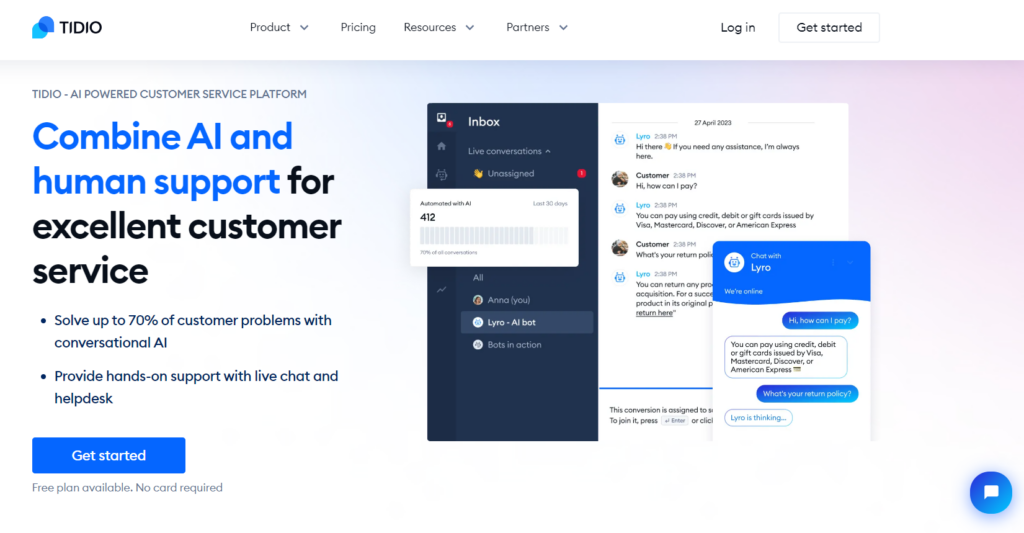
Tidio is an AI-powered help desk platform designed to enhance customer service through chat-based solutions. Ideal for small businesses, Tidio offers a free plan that allows chats with up to 50 unique users and chatbot interactions with up to 100 users each month.
A standout feature is Live Typing, which lets support teams view what customers are typing in real-time, improving response times and customer satisfaction. Tidio’s paid tiers offer flexibility, allowing businesses to focus on live chat or chatbots, with optional additional features like email marketing tools.
Integration capabilities are robust, helping streamline customer support processes across various channels. One of Tidio’s significant advantages is its AI assistance, which can handle up to 70% of customer inquiries, reducing ticket resolution times and the need for a large customer service team.
Tidio pricing
- Free Plan: $0/month
- Communicator Plan: $15.83/month per operator
- Chatbots Plan: $15.83/month
- Tidio+ Plan: Starting at $329/month
How to choose the best help desk for your small businesses
When selecting help desk software for small businesses, focus on ease of use. A user-friendly interface helps ensure quick issue resolution and boosts customer satisfaction. Ticket management is vital, letting you keep track of support requests and improving response times.
Consider integration options too. Connecting with other systems enhances functionality and streamlines workflows. Think about scalability; your help desk should grow with your business and adapt to increasing ticket volumes.
Budget is another important factor. Look for affordable solutions that meet your needs without extra frills. Prioritize essential desk features that support core operations.
Here’s what to consider:
- Ease of Use: Choose intuitive interfaces for smooth operations.
- Ticket Management: Ensure effective customer interaction tracking.
- Integration: Seamlessly connect with other tools.
- Scalability: Adapt to your business’s growth.
- Budget: Stick to essential features for cost-efficiency.
LiveAgent ranks as a top solution due to its comprehensive offerings and affordability. It includes ticket systems, self-service portals, and workflow automation, enhancing customer service operations without breaking the bank. Consider your unique needs and use this guide to choose the best help desk for your small business.
Conclusion
In conclusion, help desk software is indispensable for small businesses aiming to elevate their customer support operations. This smart solution transforms inquiries into tickets, streamlining customer interactions and speeding up resolution times. With collaborative tools, teams handle repetitive tasks efficiently, increasing overall customer satisfaction.
For small businesses seeking a robust help desk solution, LiveAgent stands out as the best overall choice. Its intuitive interface and advanced features like workflow automation boost productivity. Businesses can manage ticket volume and customer requests with ease using LiveAgent.
An appealing aspect of LiveAgent is its 30-day free trial. This allows business owners to explore its functionalities and experience seamless support operations firsthand.
For small businesses, investing in an effective ticketing system can transform customer communications. Experience LiveAgent’s capabilities and see how it can enhance your customer support team’s efficiency and effectiveness.
Share this article
The right help desk for every business
LiveAgent is a help desk software that adapts to the needs of different business models. Explore how LiveAgent fits your niche. Agency Edu and NGOs rely on LiveAgent.
All-in-one knowledge base software
Create stunning knowledge bases & FAQs with LiveAgent! Empower customers with instant answers. Free 30-day trial, no credit card required.

 Български
Български  Čeština
Čeština  Dansk
Dansk  Deutsch
Deutsch  Eesti
Eesti  Español
Español  Français
Français  Ελληνικα
Ελληνικα  Hrvatski
Hrvatski  Italiano
Italiano  Latviešu
Latviešu  Lietuviškai
Lietuviškai  Magyar
Magyar  Nederlands
Nederlands  Norsk bokmål
Norsk bokmål  Polski
Polski  Română
Română  Русский
Русский  Slovenčina
Slovenčina  Slovenščina
Slovenščina  简体中文
简体中文  Tagalog
Tagalog  Tiếng Việt
Tiếng Việt  العربية
العربية  Português
Português 



